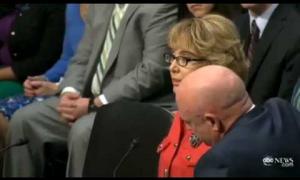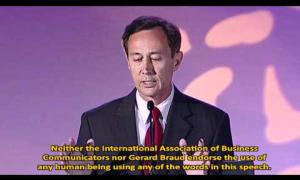From humor to history: 24 hours in the rhetorical life of a president
May 03, 2011
Sunday morning I posted a blog about the humorous remarks President Obama gave at Saturday night’s White House Correspondents’ Dinner. Then, on a quiet Sunday night, history arrived. The killing of Osama bin Laden by U.S. troops at a mansion in Pakistan stunned and surprised us, and called forth both strong and heartfelt remarks by our President. The New York Times reports he wrote the speech himself.
He did a beautiful job. He began in a straightforward manner: “Tonight I can report to the American people and to the world that the United States has conducted an operation that killed Osama bin Laden…”
Next, he drew a picture of the dark day for which bin Laden was responsible: “It was nearly 10 years ago that a bright September day was darkened by the worst attack on the American people in our history.”
Then, in elegiac prose, the President recalled the lingering pain of the deaths on that day, “the empty seat at the dinner table. Children who were forced to grow up without their mother or their father. Parents who would never know the feeling of their child’s embrace. Nearly 3,000 citizens taken from us.”
He thanked the military: “Over the past 10 years, thanks to the tireless and heroic work of our military and our counterterrorism professionals, we’ve made great strides in that effort”—referring to the war against Al Qaeda to “protect our citizens, our friends, and our allies.”
And throughout his remarks, Obama wove in the “American Story”—who we are as a people, what we stand for. He said, “In our time of grief, the American people came together. We offered our neighbors a hand, and we offered the wounded our blood. We reaffirmed our ties to each other, and our love of community and country. On that day, no matter where we came from, what God we prayed to, or what race or ethnicity we were, we were united as one American family.”
He continued, “The American people did not choose this fight. It came to our shores and started with the senseless slaughter of our citizens.” And later, “Americans understand the cost of war. Yet as a country, we will never tolerate our security being threatened, nor stand idly by when our people have been killed. We will be relentless in defense of our citizens and our friends and our allies. We will be true to the values that make us who we are…”
Near the conclusion of his remarks, he said, “Today’s achievement is a testament to the greatness of our country and the determination of the American people. Tonight we are once again reminded that America can do whatever we set our mind to. That is the story of our history…”
Finally, “Let us remember that we can do these things not just because of wealth or power, but because of who we are: one nation, under God, indivisible, with liberty and justice for all.”
A beautiful, beautiful speech. At its heart, it told a story. Not just the story of the killing of Osama bin Laden, but our story—the story of the American people. We are a peaceful people. We suffered a vicious, unprovoked attack. Because we are a good and great nation, committed to justice and the safety of our people, we pursued Osama bin Laden. Even though it took 10 years, we did not give up. This is who we are. We can do anything we set our minds to do. And we are this way because we are one nation, indivisible, under God, with liberty and justice for all.
In my post about the remarks the President gave at the Correspondents’ Dinner, I mentioned that speechwriters live for events like that—where they can let their hair down and write funny stories and anecdotes based on popular culture, current news and newsmakers.
But on a more regular basis, speechwriters also live to tell stories like this one—not about Osama bin Laden’s death, of course—but stories that should be at the heart of every speech. Why we do what we do. Why we care. Who benefits. Why it uplifts us and calls upon the “better angels” of our nature.
A speaker’s audience, no matter who it is—employees, customers, industry peers—wants to be reminded that they can make a difference in the world. That they are part of something larger than themselves. It is the speaker’s job—and the speechwriter’s—to articulate this through the stories they tell.
What stories should your speakers be telling? How can you help them do so?
Cynthia Starks is a freelance speechwriter based in Central Indiana.



